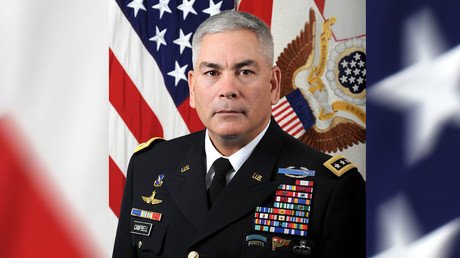Turkish prosecutor claims CIA, FBI trained coup plotters
A Turkish prosecutor has claimed that the CIA and FBI provided training for the followers of powerful US-based Turkish cleric Fethullah Gulen, whom Ankara blames for the coup attempt earlier this month.
The indictment, prepared by the Edirne Public Prosecutor’s office and accepted by the local Second Heavy Penal Court, seeks the harshest possible punishment for 43 suspects that have allegedly been linked to the failed coup attempt on July 15, including the coup’s supposed mastermind, Fethullah Gulen, the arch-nemesis of Turkish President Recep Tayyip Erdogan.
The prosecutor said on Thursday that members of what it describes as “the Fethullah Terrorist Organization” were trained by the Central Intelligence Agency (CIA) and the Federal Bureau of Investigation (FBI).
“The CIA and FBI provided training in several subjects to the cadre raised in the culture centers belonging to the Gulen movement. The operations carried out by prosecutors and security officials during the Dec. 17 process can be taken as a good example of this,” the document says, referring to a high profile corruption probe that targeted senior government officials between December 17 and December 25 of 2013, as reported by the Turkish Hurriyet daily.
The investigation affected many officials linked to the Turkish Cabinet, which was headed by Recep Tayyip Erdogan at that time. Erdogan, who is now Turkey’s president, called it “a judicial coup” attempt, while accusing Gulen and his movement of orchestrating it with the help of some “foreign forces.”
The indictment states that Gulen loyalists received US training and infiltrated judicial and security institutions.
“This [failed coup] attempt aimed to weaken the state with all its institutions by getting rid of the government completely. Those in the Gulen movement who work in the judicial and security institutions and who received the aforementioned training, took on this task and moved into action,” the document says, as quoted by the Anadolu news agency.
It adds that some other foreign secret services were also involved in training the coup plotters, according to the Turkish Yeni Safak newspaper.
Relations between Washington and Ankara soured following the foiled coup attempt on July 15. Some Turkish media and even government officials, including the labor minister, have claimed that the US was somehow involved, despite an outright denial from the US.
Immediately after the failed coup attempt, the Turkish government criticized the US for providing safe haven for Gulen, saying that a country that harbors “the coup planner” is “no friend” to Turkey. Ankara has also repeatedly demanded that the US extradite Gulen to Turkey, while Washington has maintained that Turkey must first file a formal extradition request and provide solid proof of his involvement in the coup.
On July 25, Turkey’s foreign minister, Mevlut Cavusoglu, said that Turkey-US ties could suffer unless Washington extradites Gulen.
On Friday, Erdogan once again slammed the US for harboring Gulen, who lives in self-imposed exile in Pennsylvania, and demanded his extradition. He also lashed out at the head of US Central Command, General Joseph Votel, who has criticized the detention of thousands of Turkish military personnel in the aftermath of the coup attempt and said that some of the military figures that the US had been working with are now in jail.
“It is not up to you to make that decision. Who are you? Know your place...” Erdogan said, as quoted by AP.
“Instead of thanking this nation that quashed the coup in the name of democracy, on the contrary you are taking sides with the coup-plotters,” he added, stressing that “the coup plotter is in your country anyway” and “you [the US] can never convince my people otherwise.”
On Friday, general Votel rejected Turkey’s claims.
“Any reporting that I had anything to do with the recent unsuccessful coup attempt in Turkey is unfortunate and completely inaccurate,” Votel said, according to the statement from US Central Command.
Votel added that “Turkey has been an extraordinary and vital partner in the region for many years.”
RT visits Erdogan’s self-exiled arch-nemesis Fethullah #Gulen at his US estate https://t.co/jJLaVILidlpic.twitter.com/3h1fD9FTML
— RT (@RT_com) 29 июля 2016 г.
On July 25, Yeni Safak claimed that retired US Army General John F. Campbell, the former commander of NATO forces in Afghanistan, was behind the foiled coup attempt. Campbell reportedly sent more than $ 2 billion in transactions to Turkey via Nigeria in order to distribute it among the pro-coup military. He has also been accused of managing the soldiers involved in the rebellion, the daily said, citing sources close to the investigation.
Washington later dismissed the allegations against the general, with White House press secretary Josh Earnest calling them unsubstantiated.
The US dismissed claims that it was complicit in the Turkish coup attempt as “utterly false and harmful” after Ankara declared that any state standing by US-based cleric Gulen an enemy.
On July 19, US ambassador John Bass even went on CNN Turk to dismiss the accusations against the US. “The United States government did not direct, support or know about the coup [attempt] before it happened or until it was underway,” he said at that time.
READ MORE: Turkey-US ties will suffer unless Gulen extradited, foreign minister says
Relations between the two countries have also been strained by the situation at NATO’s Incirlik air base in Turkey, which stores US tactical nuclear weapons and is being used by Washington in its campaign against Islamic State (IS, formerly ISIS/ISIL) in neighboring Syria and Iraq.
About 1,000 people gathered at the base on Thursday in an anti-US protest to demand the closure of the facility.
Turkish prosecutors and police have conducted searches at the base, and its commander, General Bekir Ercan Van, has been arrested along with more than a dozen lower ranking officers on charges of complicity in the attempted coup.
According to Turkish officials, 270 people were killed in the July 15 uprising against President Erdogan, including 24 plotters. More than 18,000 people have been detained since the foiled coup attempt, Turkish Interior Minister Efkana Ala announced recently. Over 45,000 members of the army, judiciary, police, and media, as well as civil servants, have been fired.















